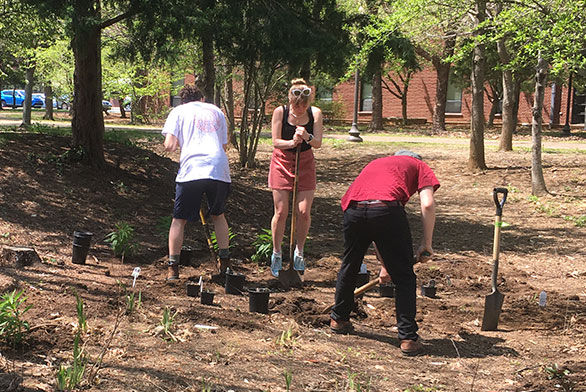Annapolis Tutor Sarah Benson Integrates Program Work with Volunteerism
August 4, 2023 | By Meliha Anthony (A25)
Benson strikes a balance between intellectual pursuits and real-world action through her work with the Anne Arundel County Watershed Stewards Academy.
Peering out her window, Sarah Benson wishes her home’s yard were different. The yard of her dreams involves “a lot less grass,” she says. “It’s not like you’re going to turn your yard into a primeval forest, but it actually does matter that you ... plant host plants for insects that live in your area,” Benson says.

Benson views lawns in a new light after learning about the importance of native plant species that support local pollinators like insects and birds. She has spent the past five years acquiring knowledge such as this, volunteering with the Anne Arundel County Watershed Stewards Academy (WSA). Founded in 2008 by executive director Suzanne Etgen, the WSA trains volunteers, or stewards, to be the “first line of information and action access for their communities,” according to Etgen. With the organization, helpers, including Benson, install landscape projects that reduce watershed pollution and organize campaigns to encourage sustainable habits at the individual level.
Benson and Etgen describe stewards’ efforts to plant trees and rain gardens, which can combat the negative effects of impervious surfaces: artificial structures like roads, sidewalks, and rooftops that prevent water from soaking into the ground, effectively disrupting the water cycle. These disruptions can also cause water to pick up pollutants that flow through local waterways and into the Chesapeake Bay.
“We’re just meant to be resources for our neighborhoods and communities—to do projects that help clean up pollution at its source,” Benson says.
Benson’s interest in the WSA was first sparked after a neighborhood meeting where she heard about the use of herbicides in a nearby marsh to eliminate phragmite grasses, a non-native weed that spreads quickly and disturbs the natural ecosystem. She wondered about the safety of such procedures. Guided by curiosity about her local environment, Benson researched marsh restoration practices and stumbled upon the WSA.
“I really wouldn’t have known how to recognize a native plant or a non-native plant, or known why it mattered, or what the difference was” before becoming a watershed steward, Benson says, “so it’s been really illuminating to learn to look at the landscape in a different way.”
She likens her awakening to how the freshman laboratory at St. John’s helps students perceive the world around them with fresh eyes. When students conduct dissections or sketch plants, for example, they are not provided with an explicit end goal for the project. Through this experience, she says, they should be thinking, “This is messy, and complicated; how would I start asking questions about it, and making sense of it?” Stepping into the unknown is important in the learning process and allows students to reckon with questions about their own impact.
“It’s inevitable that people are going to tamper with the environment, so how do we fit in here?” Benson asks. Part of the watershed stewards’ goal is to help fellow community members establish sustainable habits. For example, individuals can limit their negative impact by avoiding single-use plastics and chemical pesticides in their daily lives.
“There are a lot of things that everyone can do in their immediate environment that make a huge difference,” Benson says.
As a tutor, Benson notes that it’s all too easy to fully immerse oneself in program readings. Students’ volunteer efforts inspire her to get more involved in the community, and Benson sees significant overlap between her role with the WSA and as an educator.
“One of the reasons we look at the books is that it’s someone’s example of a way of interpreting the world,” Benson says. “But your role really is to go ahead and interpret the world.”
A similar realization motivated Etgen to study religion and ecology in graduate school. Etgen recalls asking herself, “How do people really move themselves to action?” She became interested, she says, in “the linkages between people’s spirituality and their motivations for action.” Knowledge and religion can inspire action, but the only necessary foundation for philanthropy is concern for the people around you, Etgen notes.
“The best environmental leaders are not environmental experts,” she says. “They’re people that just care about their community.”
Etgen references the movie It’s A Wonderful Life, where the protagonist sees what his town would look like if he had never been born–only to discover he has improved the lives of so many people around him.
“What would happen if a watershed steward hadn’t become a watershed steward? What would Anne Arundel County look like?” Etgen asks. “It would be so vastly different, because [they] are just transforming communities.”
Benson herself is helping to transform St. John’s Annapolis campus, collaborating with students, faculty, and staff to plant a campus rain garden with native plants. She says her job as a St. John’s tutor continuously inspires her to try and make the world a better place, even if it sometimes requires leaving her comfort zone.
“Seeing all the things students do reminds me that I need to also do other things with what I’ve learned at St. John’s,” Benson says. “It’s okay when you’re a grown-up to be an amateur at something, to keep learning and trying new things.”

